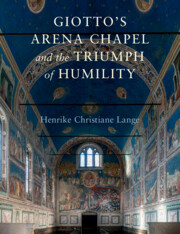Book contents
- Giotto’s Arena Chapel and the Triumph of Humility
- Giotto’s Arena Chapel and the Triumph of Humility
- Copyright page
- Dedication
- Epigraph
- Contents
- Figures
- Preface
- Acknowledgments
- Introduction
- Chapter 1 A Venetian Dream of Rome and Jerusalem
- Chapter 2 1300: The Moment of the Jubilee in Rome and in Padua
- Chapter 3 The Powers That Were
- Chapter 4 Giotto’s Painted Reliefs
- Chapter 5 Triumph and Apotheosis, Augustine to Dante
- Epilogue
- Appendices
- Notes
- Select Bibliography
- Index
Chapter 5 - Triumph and Apotheosis, Augustine to Dante
Published online by Cambridge University Press: 12 January 2023
- Giotto’s Arena Chapel and the Triumph of Humility
- Giotto’s Arena Chapel and the Triumph of Humility
- Copyright page
- Dedication
- Epigraph
- Contents
- Figures
- Preface
- Acknowledgments
- Introduction
- Chapter 1 A Venetian Dream of Rome and Jerusalem
- Chapter 2 1300: The Moment of the Jubilee in Rome and in Padua
- Chapter 3 The Powers That Were
- Chapter 4 Giotto’s Painted Reliefs
- Chapter 5 Triumph and Apotheosis, Augustine to Dante
- Epilogue
- Appendices
- Notes
- Select Bibliography
- Index
Summary
This chapter addresses textual and spiritual “spolia,” a term used in art history to describe any material or immaterial remnant from the past purposefully taken and inserted into a new context. Here the term is considered with its textual and spiritual resonances in Augustine (354–430), Giotto (?1337), and Dante (1265–1321), examining how they relate their works to the legacy of the ancients – both the Hebrew Bible and Greco-Roman letters, arts, and architecture. From its beginnings, Christianity had to develop a means for recuperating, relating to, and using the legacy of the pagan imperial past. In the early fourteenth century, particularly in Italy, questions that the early Christians had pondered reemerged in new forms – the Roman elements of Giotto’s chapel and Dante’s Comedy, under the guidance of Virgil, are exemplary of this complex relationship, as is Augustinianism contemporary to Giotto. Augustine – channeled through the exegesis of his fourteenth-century readers – is the most important link to the ancient Roman past, for Giotto’s chapel in particular, as Giuliano Pisani has shown, and in the larger historical context of the times.1 Augustine’s works were better known than those of any other church father, especially his De doctrina and De rubibus. His City of God foregrounds the issue of humility, installing Psalms of introspective intensity against the vainglorious character of the Romans. In Augustine, Dante, and Giotto, there is a celebration of the triumph of Christianity over paganism even while, or especially as, these figures make explicit use of the legacy of the pagans.
- Type
- Chapter
- Information
- Giotto's Arena Chapel and the Triumph of Humility , pp. 175 - 199Publisher: Cambridge University PressPrint publication year: 2023

